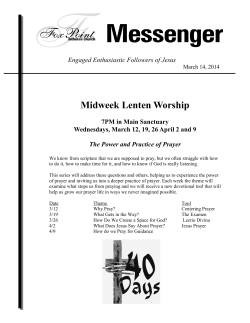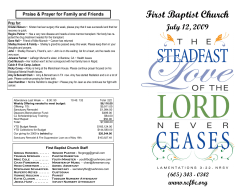
MASTER TRAINER – International Level ... 1 2.4 How can we teach children to pray?
MASTER TRAINER – International Level 2.4 How can we teach children to pray? www.teachingforafrica.com 1 2.4 How can we teach children to pray? Why is it important to pray and to teach children to pray in Sunday school? It is important to pray in Sunday school, in order to bring God’s blessing on our program and teaching for the children. We also pray in Sunday school in order to set an example for the children to show them how they can pray at home. Many times, children who attend our Sunday school have seen many bad examples. They have seen people pray in ways of which the Bible does not approve. For example, many have seen people pray to “the saints”, pray to God in the name of other religious leaders, pray to the departed spirits of the ancestors or nature spirits. They do not have any idea how the Bible tells believers to pray. Some other children want to pray to God, but they don’t know what to pray about. All these children need to learn how and about what subjects the Bible tells us to pray. So prayer and teaching about prayer is a very important part of our Sunday school program. There children can learn God’s principles of prayer and see prayer demonstrated in a Biblical way. How should we teach children to pray? 1. Use a special song to introduce the prayer time each week. Choose either a song about prayer or a song that is itself a prayer. Use the same song week after week as an introduction to prayer time. Example: Whisper a Prayer in the Morning or Sweet Hour of Prayer 2. In a new Sunday school, the teacher should pray first. When a church begins a new Sunday school, in the beginning the children might be afraid or bashful about praying in front of others. They may not know how to pray. To avoid problems, the teacher can pray in the very beginning. This allows the children to hear how they should pray. The teacher should pray short, natural prayers in ordinary language. Then the children will know that they, too, can talk to God the same way. He should be familiar with the Biblical principles of prayer so that he does not violate any of them. But you shouldn’t continue having the teacher pray for too long a time. We don’t want the children to get the idea that praying is something only teachers do. As soon as possible, they, too, should begin to participate. 3. Teach only one principle of prayer at a time. We have listed many principles of prayer. Choose one that will help your students, and teach only that one principle at a time. Keep reviewing and explaining it until the children understand it and begin to use it. Each principle may take from two to five weeks to master, depending on the understanding of the children. 4. Keep reviewing the principles you have already covered. Each week, use one minute of class time to review quickly 3 or 4 principles of prayer that the children have already learned. This can be done by asking questions or starting a statement and having them complete it. Or, you may tell them you are going to give a bad example of prayer and then ask them to correct it and tell you which principle was violated. Once you have covered many principles, don’t review them all every week. Choose a very few to review each time. 5. Put the principles of prayer into immediate practice as soon as the children learn them. _______________________________________________________________ Developed and copyrighted by Every Child Ministries, “Hope for the forgotten children of Africa” Please contact ECM for permission to reprint for use in other ministries. PO Box 810 Hebron, IN 46341 USA email: ecmafrica@ecmafrica.org MASTER TRAINER – International Level 2.4 How can we teach children to pray? www.teachingforafrica.com 2 After you have taught a principle of prayer, begin to demonstrate and use that principle right away. Example: If you have taught the principle that we should pray for our church leaders, during prayer time that day, be sure to mention the leaders of your local church. In the following weeks also, keep on remembering them in prayer. 6. What should you do if some children have unbiblical prayer habits? If your Sunday school is drawing children of the area from other religious backgrounds, it could be that a child may pray in a way that the Bible does not approve, even in Sunday school. I myself called on a child in the early days of my ministry in Africa, and the child stood up in Sunday school and prayed fervently to Mary! However, you will not have this problem often if you are teaching the children the Biblical principles of prayer. Before the children begin to pray, remind them by asking them, “To whom should we pray?” (To God our Father) “In whose name should we pray?” (In the name of Jesus). You cannot really control what the children do in the homes, or in other churches they may attend in addition to Sunday school, but you can give a good example in Sunday school. If a child begins to pray publicly in a way the Bible does not approve, do not make him feel ashamed. Do not get angry or scold or punish him. Do, however, put a quick end to his unbiblical praying. You might do it something like this: Say in a firm but not an angry voice, “Excuse me.” Put your hand on his shoulder and repeat it again if he does not stop praying right away. Then say something like this: “I’m sorry. You didn’t know the way we do it (or you forgot). In Sunday school we pray only in the Bible way. We pray…(then show the correct way to pray, for example, To God in Jesus’ name). Give him another chance if he wants, and be sure to talk privately with him after Sunday school, to make sure he understands why you stopped him, and that you are not angry with him. Perhaps you could compliment him on the way he finally prayed. Try to end on a positive note. If children inform you that they pray in a different way at home or in their church, just say, “In our Sunday school we like to pray the Bible way.” 7. Ask for volunteers to pray rather than making children do it. You may ask in a general way who would like to pray, and then recognize one child. Or, you may ask certain children ahead of time if they are willing to pray. Try to let many different children pray, not just the same ones all the time. 8. Encourage children who pray well. When the children follow the principles you are teaching them, recognize their effort and encourage them. You can say something like: “That was a good prayer. You remembered…(whatever principle the child observed). 9. Give the children some ideas of good subjects for prayer. You may bring four or five children up front to pray. Assign each one a subject for prayer. Example: First child—Just praise God. Second child—Pray for our pastor and church leaders. Third child— Pray for those who are sick. Fourth child—Pray for the children of the village who are not yet saved. Fifth child—Pray for children in other countries where it is hard to be a Christian, like Libya, Sudan, etc. 10. From time to time, use songs as prayers. A song can itself be a prayer. Children can sing it in a prayerful attitude, and it will become the prayer of their hearts. Example: A song may ask God for healing. As the children sing, have those _______________________________________________________________ Developed and copyrighted by Every Child Ministries, “Hope for the forgotten children of Africa” Please contact ECM for permission to reprint for use in other ministries. PO Box 810 Hebron, IN 46341 USA email: ecmafrica@ecmafrica.org MASTER TRAINER – International Level 2.4 How can we teach children to pray? www.teachingforafrica.com 3 who seek healing stand or hold up their hands. A song may ask God for forgiveness. Have each child quietly name his sin to God and then sing the song together, asking His cleansing. What principles of prayer should we teach the children? Following are some principles about prayer that we can teach the children one by one, little by little. To teach all these principles may easily take a year or even longer. When you have taught all these, you can either go back and review them again, or you can add to these other principles of prayer that you have learned from the Bible. These principles can be taught in any order. Choose those to teach first that you perceive to be the most needed in your class. Some Biblical principles of prayer that you could teach (remember, in any order): 1. It is very important for Christians to pray. Mark 13:33, Luke 6:12, James 5:16-18 2. God is anxious to help us, but He waits for us to ask for His help. Matthew 7:11, Psalms 65:2, Jeremiah 33:3 3. We can pray anytime, anywhere. Psalms 55:17, 1 Timothy 2:8 4. We can ask God for help in hard times or when we are in trouble. Matthew 6:9, Luke 4:8 5. We should pray to God alone, not to anyone or anything else. Matthew 6:9, Luke 4:8 6. We should pray to God in Jesus’ name. 1 Timothy 22:5, John 14:13 7. We should thank and praise God. 1 Thessalonians 5:16-18 8. We should keep on praying until the answer comes, even if it takes a long time. Luke 18:1, 1 Thessalonians 5:17 9. We can pray kneeling (Luke 22:41), standing (Mark ll:25), or sitting, with our hands folded or with our hands raised (1 Timothy 2:8), that is, in any posture. 10. We can pray to God in song (Psalms 9:1-2, James 5:13), or with tears (Psalms 39:12). 11. We must be willing to accept God’s will in the matters we pray about. Luke 22:42, 1 John 5:14 12. We must forgive others who have wronged or hurt us if we want God to answer our prayers. Matthew 6:14-15 _______________________________________________________________ Developed and copyrighted by Every Child Ministries, “Hope for the forgotten children of Africa” Please contact ECM for permission to reprint for use in other ministries. PO Box 810 Hebron, IN 46341 USA email: ecmafrica@ecmafrica.org MASTER TRAINER – International Level 2.4 How can we teach children to pray? www.teachingforafrica.com 4 13. We must confess and forsake our sins, otherwise they could block our prayers and keep them from being answered. Isaiah 59:1-2, John 9:31 Add others as needed from your own study of the Bible. We can also help children understand what God wants them to pray about: 1) We should pray only for that which would please and honor God. 1 John 5:14 2) We should pray asking God for salvation (if we have not yet done so). Romans 10:13, 1 Timothy 2:4 3) We should pray for the things that God emphasizes as important to Him. Examples: The salvation of individuals, the family, the church, truth and righteousness, justice, etc. 4) We can ask God for anything we really need. Philippians 4:6 5) We can ask God to help other people. Colossians 1:9 6) We can ask God to heal the sick. James 5:15 7) We should pray for our leaders. 1 Timothy 2:1-3 8) We should pray for those who are serving God (our pastors, deacons, evangelists, choir directors and members, women’s leaders, Sunday school teachers, etc.). 2 Corinthians 1:11 9) We should ask God to send forth laborers into His harvest so that others will hear the good news of Jesus. Luke 10:2 10) We can ask God for the fullness of His Spirit in our lives. Matthew 17:21, Ephesians 6:18 11) We should ask God to help us overcome temptation. Luke 22:40, 46 12) We can ask God to forgive our sins. 1 John 1:9 13) We can pray together with others. When we agree in prayer, we add strength to their prayers and ours. Matthew 18:19-20, Acts 1:14 14) We should pray even for our enemies. Luke 6:28 15) We can break the power of evil spirits in prayer. Acts 17:21, 18:18, Luke 10:17 LET’S REVIEW Underline around the right answer. Example: God is [only one, many]. We should pray to [ Saint Joseph, God only]. _______________________________________________________________ Developed and copyrighted by Every Child Ministries, “Hope for the forgotten children of Africa” Please contact ECM for permission to reprint for use in other ministries. PO Box 810 Hebron, IN 46341 USA email: ecmafrica@ecmafrica.org MASTER TRAINER – International Level 2.4 How can we teach children to pray? www.teachingforafrica.com 5 We should pray in the name of [Simon Kimbangu and Jesus, Jesus Christ only]. God [wants, does not want] to help us believers. Praying for the help of the saints is [sin, helpful]. We can pray to God for [anything at all, the things that please and honor Him]. We can break the power of evil spirits through [prayer, sorcery]. God will save every person who [calls on Him for salvation, does enough good works]. LET’S PUT IT INTO PRACTICE Which of the above principles of prayer could help your class? ……………………………………………………………………………………………………………… Write out the entire verse that goes with that teaching. Afterwards, learn the verse by heart so you will be ready to use it in teaching. ……………………………………………………………………………………………………………… _______________________________________________________________ Developed and copyrighted by Every Child Ministries, “Hope for the forgotten children of Africa” Please contact ECM for permission to reprint for use in other ministries. PO Box 810 Hebron, IN 46341 USA email: ecmafrica@ecmafrica.org
© Copyright 2025









